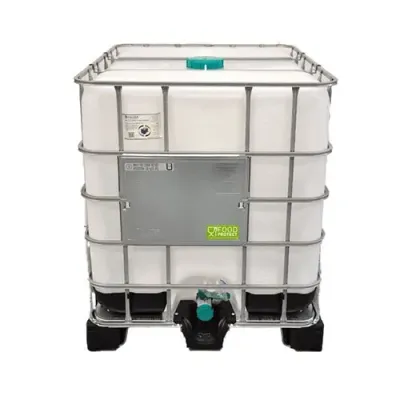 Add My Company
Add My Company

When it comes to food and beverage production, safety and quality are paramount. One small misstep in storage or transportation can compromise an entire batch of products, damage a company’s reputation, or worse, put customers’ health at risk.
That’s where Intermediate Bulk Containers (IBCs) come in—a versatile, reliable, and efficient solution that is meeting the industry’s stringent demands.
But why are IBC containers so highly favoured, and how do they contribute to maintaining food safety and product quality?
This blog dives into the essential role IBC containers play in the food and beverage sector, their benefits, and why they are indispensable for forward-thinking manufacturers.
What Are IBC Containers and Why Do They Matter in Food and Beverage?
Intermediate Bulk Containers, often simply referred to as IBC containers, are large, reusable storage and transport units designed to safely handle liquids, powders, granules, and semi-solids.
Made from durable materials like high-density polyethylene (HDPE) or stainless steel, they are engineered to withstand varying environmental conditions while maintaining the integrity of their contents.
For the food and beverage sector, where stringent hygiene standards are non-negotiable, the construction and functionality of IBC containers are game-changing.
They not only ensure that food safety regulations are upheld but also make operations more streamlined and efficient.
Key Features of IBC Containers Relevant to Food Safety
Hygienic Materials
IBCs are often crafted from food-grade materials, such as HDPE or stainless steel, which resist contamination and do not react with sensitive products.
Easy to Clean
Many IBCs feature seamless interiors and modular designs, ensuring they can be thoroughly cleaned and sanitised between uses to prevent cross-contamination.
Airtight and Secure
Equipped with secure seals and lids, IBC containers protect against external contaminants, keeping the contents fresh and safe throughout handling and transportation.
Chemical Resistance
Thanks to their durable construction, IBCs withstand exposure to acidic or alkaline food products without degradation, making them ideal for a variety of food and beverage applications.
The Benefits of IBC Containers in Food and Beverage
The benefits of using IBC containers in the food and beverage industry go far beyond compliance with safety standards. They offer practical solutions to some of the most common storage and transport challenges faced by food manufacturers.
Ensuring Food Safety and Hygiene
One of the most critical aspects of food safety is preventing contamination. IBCs help manufacturers stay compliant with food safety regulations such as HACCP (Hazard Analysis and Critical Control Points) and ISO 22000 standards.
With their food-grade materials and robust engineering, IBCs safeguard against bacterial growth, leaks, and other risks, offering peace of mind for both producers and consumers.
Maintaining Product Quality
Whether it’s a batch of olive oil, fruit juice, or chocolate syrup, product quality can make or break a brand’s reputation. IBCs ensure the integrity of ingredients and finished products by providing airtight storage and protection from environmental factors like light, moisture, and temperature fluctuations.
For instance, stainless steel IBC containers are ideal for products such as wine or dairy, where preserving taste, quality, and consistency is crucial.
Enhancing Operational Efficiency
Efficiency is key in the competitive food and beverage landscape. IBC containers optimise the storage and transport of bulk materials, whether raw ingredients or finished goods.
Space-Efficient Design
IBCs, with their cube-shaped construction, maximise storage capacity when compared to cylindrical barrels. Stacking capabilities further reduce the warehouse footprint.
Easy Handling
Designed to work seamlessly with forklifts and pallet jacks, IBCs reduce manual labour and streamline handling processes, from warehouse storage to delivery.
Sustainability Benefits
Sustainability is increasingly becoming a top priority for food and beverage businesses. Reusable and recyclable, IBC containers are an eco-friendly solution that aligns with modern sustainability goals.
Stainless steel IBCs, in particular, can be reused for decades with proper maintenance, drastically reducing waste.
Additionally, by allowing precise dosage and dispensing of contents, IBCs minimise product waste during the production process.
Cost-Effectiveness
Though the upfront cost of IBC containers may be higher than traditional barrels or bins, they offer considerable long-term savings. Their durability, reusability, and ability to optimise storage and transport costs make them an economical choice for businesses large and small.
Applications of IBC Containers in the Food and Beverage Industry
IBC containers cater to a wide range of applications, making them versatile and valuable across the industry.
Liquid Storage and Transport
Products like juices, edible oils, sauces, and syrups benefit greatly from the secure, leak-proof design of IBCs. The option to integrate features such as spigots or valves ensures precise dispensing and reduces waste.
Powders and Granules
Flour, sugar, spices, and other dry ingredients are safely stored in IBCs, maintaining their freshness and protecting against contamination.
Specialty Segments
Certain food and beverage items, like wines and craft beers, require specialised containers to preserve their flavour and quality.
Stainless steel IBCs are often preferred for these applications due to their ability to prevent oxidation and maintain desired temperatures.
How to Select the Right IBC Container
Not all IBC containers are the same, so it’s important to choose one that matches your specific needs.
- Material: For liquids or perishable goods, consider food-grade HDPE or stainless steel.
- Capacity: Choose the right size to minimise waste and optimise storage.
- Design Features: Look for integrated valves, seamless interiors, or specific insulation properties, depending on your product’s requirements.
- Compliance: Ensure the IBC meets food safety standards and certifications relevant to your region or sector.
Trusted Solutions for Food and Beverage Storage
At ITP Packaging, we understand the intricate needs of the food and beverage industry.
Our range of IBC containers is expertly designed to ensure safety, quality, and efficiency at every step of your production process.
Whether you’re a growing small business or an established name in the industry, our solutions can be tailored to suit your unique requirements.
We are committed to helping you maintain food safety and elevate your operational standards.
Moving Forward with IBC Containers
If your business prioritises safety, quality, and sustainability, investing in IBC containers is a straightforward choice. They’re more than just a storage solution—they’re a commitment to excellence.
Navigating the vast selection of IBCs on the market can feel overwhelming, but with a trusted partner like ITP Packaging, the process becomes as seamless as our containers.
Explore our range of IBC solutions today and take the first step towards better, safer, and more efficient food and beverage operations.
For more information on IBC Containers in the Food and Beverage Industry talk to ITP Packaging Ltd

